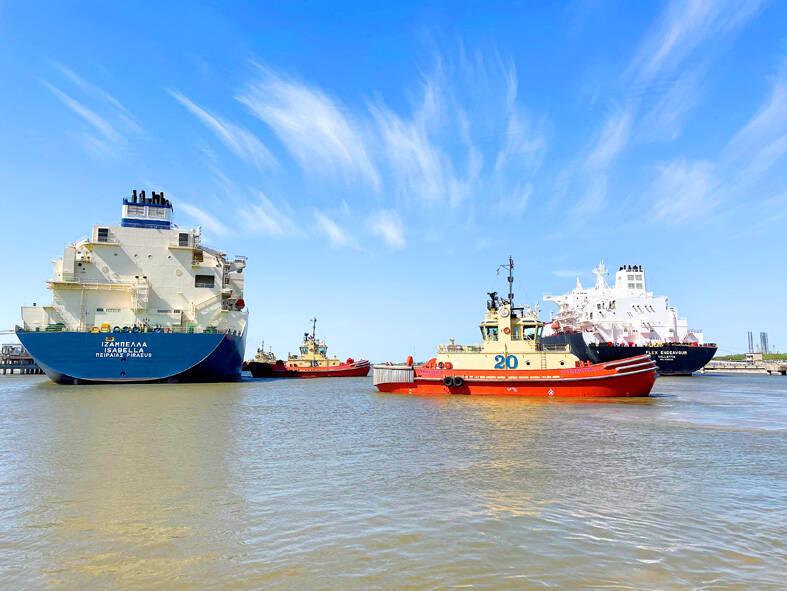US President Donald Trump’s energy security council plans to host a summit in Alaska in early June, when it hopes Japan and South Korea would announce commitments to the Alaska liquefied natural gas (LNG) project, a source familiar with the matter said on Thursday.
Trump has touted the US$44 billion Alaska LNG project, which would deliver gas from the state’s North Slope fields via a 1,300km pipeline for domestic use and send it to customers in Asia as LNG, bypassing the Panama Canal.
While the project has been talked about for years, progress has been limited by cost and the amount of work needed.

Photo: Reuters
Trump, who has pushed allies to buy US energy while simultaneously threatening trade tariffs, has asked Japanese Prime Minister Shigeru Ishiba to support the Alaska plan.
Last month, CPC Corp, Taiwan (台灣中油) signed a non-binding agreement with the state-run Alaska Gasline Development Corp, to buy LNG and invest in the project, a move President William Lai (賴清德) said would ensure the nation’s energy security.
The summit being planned by the National Energy Dominance Council, which wants to maximize production of oil and gas, would take place on June 2. It was first reported by the New York Times.
The White House and the US Department of the Interior did not immediately respond to a request for comment.
Separately, officials from Thailand, which could also be a consumer of the LNG from Alaska, and South Korea are expected to visit the state to talk about the project sometime in the next two weeks, said a source who spoke on the condition of anonymity.
It would be the first visit to Alaska by Thai officials to talk about the project in Trump’s second administration.
South Korean Minister of Trade, Industry and Energy Ahn Duk-geun on Thursday said that he was not aware of a plan to announce its commitment, and that “there are still a lot of things that need to be done” through due diligence of the Alaska LNG project “to understand the local situation more accurately.”
The country is dispatching an inspection team, and results of the due diligence would need to be seen to discuss how it should proceed, Ahn said.

To many, Tatu City on the outskirts of Nairobi looks like a success. The first city entirely built by a private company to be operational in east Africa, with about 25,000 people living and working there, it accounts for about two-thirds of all foreign investment in Kenya. Its low-tax status has attracted more than 100 businesses including Heineken, coffee brand Dormans, and the biggest call-center and cold-chain transport firms in the region. However, to some local politicians, Tatu City has looked more like a target for extortion. A parade of governors have demanded land worth millions of dollars in exchange

An Indonesian animated movie is smashing regional box office records and could be set for wider success as it prepares to open beyond the Southeast Asian archipelago’s silver screens. Jumbo — a film based on the adventures of main character, Don, a large orphaned Indonesian boy facing bullying at school — last month became the highest-grossing Southeast Asian animated film, raking in more than US$8 million. Released at the end of March to coincide with the Eid holidays after the Islamic fasting month of Ramadan, the movie has hit 8 million ticket sales, the third-highest in Indonesian cinema history, Film

BIG BUCKS: Chairman Wei is expected to receive NT$34.12 million on a proposed NT$5 cash dividend plan, while the National Development Fund would get NT$8.27 billion Taiwan Semiconductor Manufacturing Co (TSMC, 台積電), the world’s largest contract chipmaker, yesterday announced that its board of directors approved US$15.25 billion in capital appropriations for long-term expansion to meet growing demand. The funds are to be used for installing advanced technology and packaging capacity, expanding mature and specialty technology, and constructing fabs with facility systems, TSMC said in a statement. The board also approved a proposal to distribute a NT$5 cash dividend per share, based on first-quarter earnings per share of NT$13.94, it said. That surpasses the NT$4.50 dividend for the fourth quarter of last year. TSMC has said that while it is eager

‘IMMENSE SWAY’: The top 50 companies, based on market cap, shape everything from technology to consumer trends, advisory firm Visual Capitalist said Taiwan Semiconductor Manufacturing Co (TSMC, 台積電) was ranked the 10th-most valuable company globally this year, market information advisory firm Visual Capitalist said. TSMC sat on a market cap of about US$915 billion as of Monday last week, making it the 10th-most valuable company in the world and No. 1 in Asia, the publisher said in its “50 Most Valuable Companies in the World” list. Visual Capitalist described TSMC as the world’s largest dedicated semiconductor foundry operator that rolls out chips for major tech names such as US consumer electronics brand Apple Inc, and artificial intelligence (AI) chip designers Nvidia Corp and Advanced